英文 介绍日本文化
- 格式:ppt
- 大小:5.29 MB
- 文档页数:36
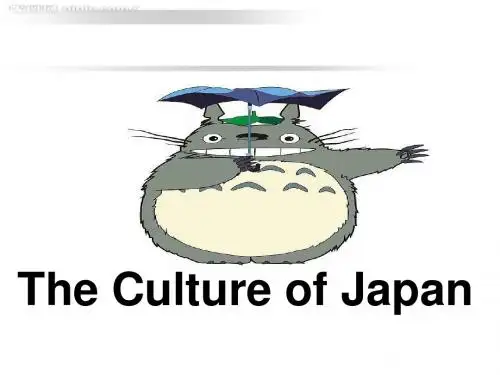
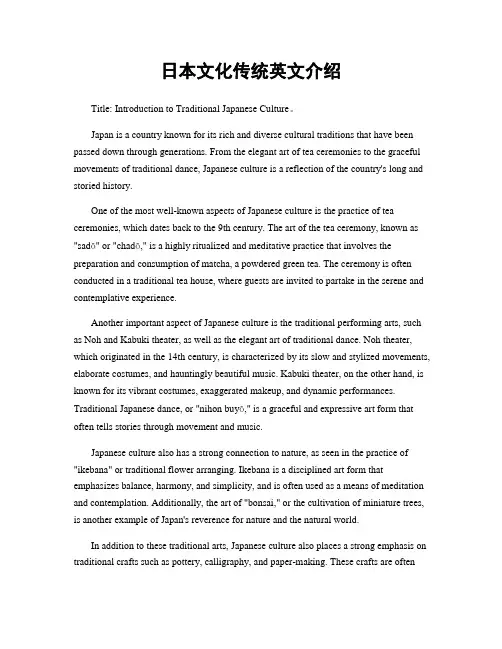
日本文化传统英文介绍Title: Introduction to Traditional Japanese Culture。
Japan is a country known for its rich and diverse cultural traditions that have been passed down through generations. From the elegant art of tea ceremonies to the graceful movements of traditional dance, Japanese culture is a reflection of the country's long and storied history.One of the most well-known aspects of Japanese culture is the practice of tea ceremonies, which dates back to the 9th century. The art of the tea ceremony, known as "sadō" or "chadō," is a highly ritualized and meditative practice that involves the preparation and consumption of matcha, a powdered green tea. The ceremony is often conducted in a traditional tea house, where guests are invited to partake in the serene and contemplative experience.Another important aspect of Japanese culture is the traditional performing arts, such as Noh and Kabuki theater, as well as the elegant art of traditional dance. Noh theater, which originated in the 14th century, is characterized by its slow and stylized movements, elaborate costumes, and hauntingly beautiful music. Kabuki theater, on the other hand, is known for its vibrant costumes, exaggerated makeup, and dynamic performances. Traditional Japanese dance, or "nihon buyō," is a graceful and expressive art form that often tells stories through movement and music.Japanese culture also has a strong connection to nature, as seen in the practice of "ikebana" or traditional flower arranging. Ikebana is a disciplined art form that emphasizes balance, harmony, and simplicity, and is often used as a means of meditation and contemplation. Additionally, the art of "bonsai," or the cultivation of miniature trees, is another example of Japan's reverence for nature and the natural world.In addition to these traditional arts, Japanese culture also places a strong emphasis on traditional crafts such as pottery, calligraphy, and paper-making. These crafts are oftenpassed down through families and communities, and are valued for their beauty, precision, and connection to the past.Overall, traditional Japanese culture is a reflection of the country's deep respect for history, nature, and the arts. From the serene beauty of tea ceremonies to the vibrant performances of traditional theater, Japan's cultural traditions continue to inspire and captivate people around the world.。
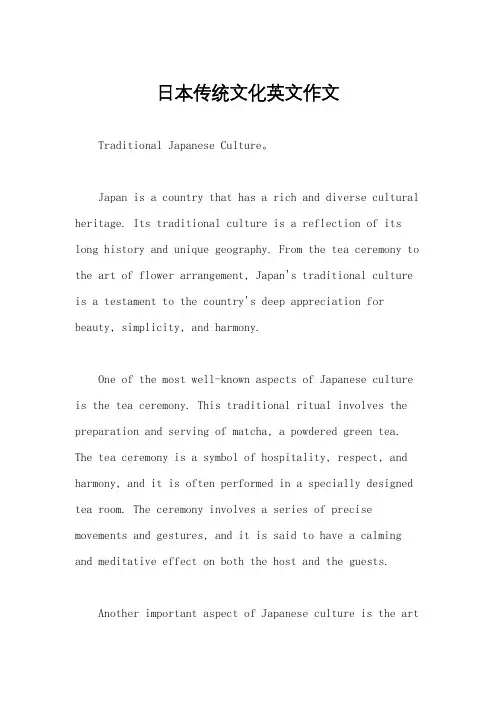
日本传统文化英文作文Traditional Japanese Culture。
Japan is a country that has a rich and diverse cultural heritage. Its traditional culture is a reflection of its long history and unique geography. From the tea ceremony to the art of flower arrangement, Japan's traditional culture is a testament to the country's deep appreciation for beauty, simplicity, and harmony.One of the most well-known aspects of Japanese culture is the tea ceremony. This traditional ritual involves the preparation and serving of matcha, a powdered green tea. The tea ceremony is a symbol of hospitality, respect, and harmony, and it is often performed in a specially designed tea room. The ceremony involves a series of precise movements and gestures, and it is said to have a calming and meditative effect on both the host and the guests.Another important aspect of Japanese culture is the artof flower arrangement, or ikebana. Ikebana is a form of art that emphasizes the beauty of simplicity. It involves the arrangement of flowers, leaves, and other natural materials in a way that creates a harmonious and balanced composition. Ikebana is often used in traditional Japanese homes and temples as a way to create a peaceful and serene atmosphere.In addition to the tea ceremony and ikebana, Japan's traditional culture also includes a variety of other art forms, such as calligraphy, painting, and pottery. Calligraphy, or shodo, is the art of writing Japanese characters with a brush and ink. It is considered a form of meditation and is often used as a way to express one's emotions and thoughts. Painting, or sumi-e, is a form ofink wash painting that emphasizes the beauty of simplicity and the natural world. Pottery, or yakimono, is a form of ceramic art that has a long history in Japan and is knownfor its delicate beauty and functionality.Overall, Japan's traditional culture is a reflection of its deep appreciation for beauty, simplicity, and harmony. From the tea ceremony to the art of flower arrangement,these traditional practices have been passed down from generation to generation and continue to be an important part of Japanese life today.。
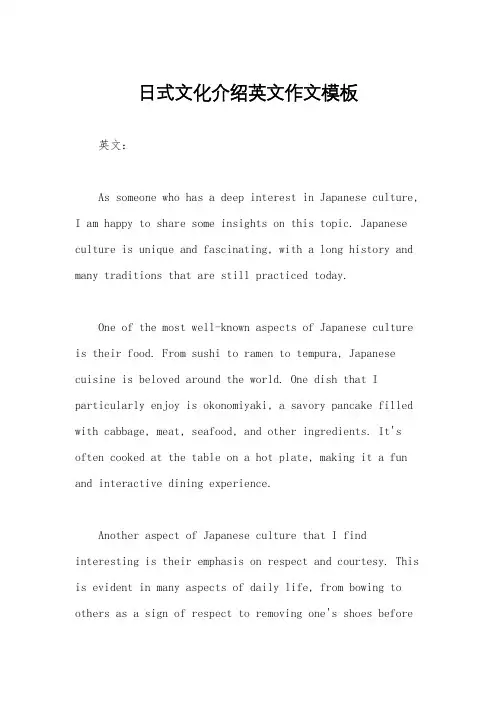
日式文化介绍英文作文模板英文:As someone who has a deep interest in Japanese culture, I am happy to share some insights on this topic. Japanese culture is unique and fascinating, with a long history and many traditions that are still practiced today.One of the most well-known aspects of Japanese culture is their food. From sushi to ramen to tempura, Japanese cuisine is beloved around the world. One dish that I particularly enjoy is okonomiyaki, a savory pancake filled with cabbage, meat, seafood, and other ingredients. It's often cooked at the table on a hot plate, making it a fun and interactive dining experience.Another aspect of Japanese culture that I find interesting is their emphasis on respect and courtesy. This is evident in many aspects of daily life, from bowing to others as a sign of respect to removing one's shoes beforeentering a home. Even the way that business cards are exchanged is done with great care and respect.In terms of entertainment, Japanese culture has also made an impact around the world. Anime and manga, for example, have gained a huge following outside of Japan. One of my favorite anime series is "Your Lie in April," which tells the story of a young pianist who rediscovers his love for music with the help of a talented violinist.Overall, Japanese culture is rich and diverse, with many fascinating aspects to explore. Whether it's through food, traditions, or entertainment, there's something for everyone to appreciate.中文:作为一个对日本文化深感兴趣的人,我很高兴能够分享一些关于这个话题的见解。
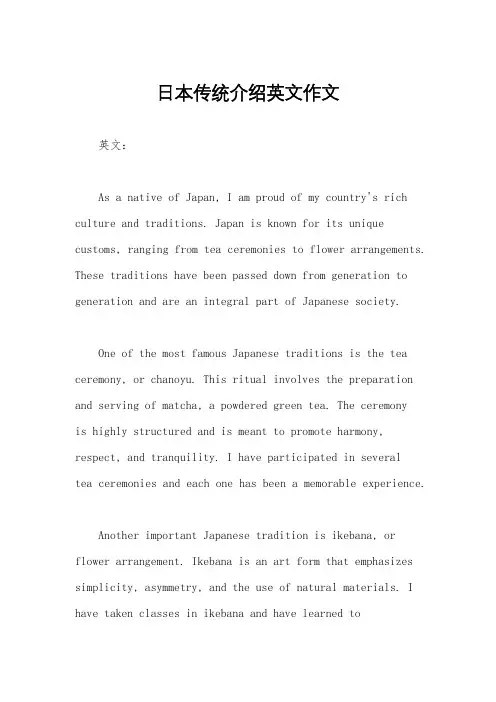
日本传统介绍英文作文英文:As a native of Japan, I am proud of my country's rich culture and traditions. Japan is known for its unique customs, ranging from tea ceremonies to flower arrangements. These traditions have been passed down from generation to generation and are an integral part of Japanese society.One of the most famous Japanese traditions is the tea ceremony, or chanoyu. This ritual involves the preparation and serving of matcha, a powdered green tea. The ceremonyis highly structured and is meant to promote harmony, respect, and tranquility. I have participated in severaltea ceremonies and each one has been a memorable experience.Another important Japanese tradition is ikebana, or flower arrangement. Ikebana is an art form that emphasizes simplicity, asymmetry, and the use of natural materials. I have taken classes in ikebana and have learned toappreciate the beauty of arranging flowers in a way that highlights their natural form.In addition to these well-known traditions, there are many other aspects of Japanese culture that are worth exploring. For example, Japanese cuisine is renowned forits freshness and attention to detail. From sushi to ramen, there is something for everyone to enjoy.Overall, I believe that Japan's traditions are an important part of our cultural heritage and should be celebrated and preserved for future generations.中文:作为日本人,我为我的国家丰富的文化和传统感到自豪。

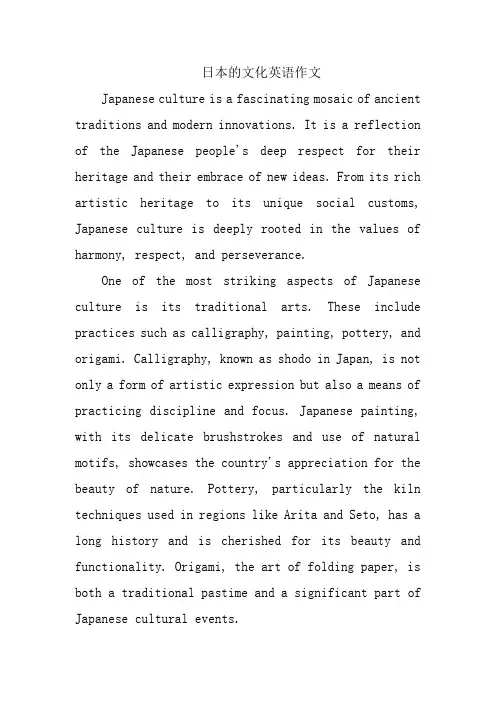
日本的文化英语作文Japanese culture is a fascinating mosaic of ancient traditions and modern innovations. It is a reflection of the Japanese people's deep respect for their heritage and their embrace of new ideas. From its rich artistic heritage to its unique social customs, Japanese culture is deeply rooted in the values of harmony, respect, and perseverance.One of the most striking aspects of Japanese culture is its traditional arts. These include practices such as calligraphy, painting, pottery, and origami. Calligraphy, known as shodo in Japan, is not only a form of artistic expression but also a means of practicing discipline and focus. Japanese painting, with its delicate brushstrokes and use of natural motifs, showcases the country's appreciation for the beauty of nature. Pottery, particularly the kiln techniques used in regions like Arita and Seto, has a long history and is cherished for its beauty and functionality. Origami, the art of folding paper, is both a traditional pastime and a significant part of Japanese cultural events.Japanese cuisine, known as washoku, is world-renowned for its delicate flavors, intricate presentation, and emphasis on seasonal ingredients. Dishes such as sushi, tempura, and ramen have gained global popularity, reflecting the influence of Japanese cuisine on world food cultures. The art of tea ceremony, orchanoyu, is another important aspect of Japanese culture, symbolizing harmony, respect, and tranquility.Social customs in Japan are characterized by a strong sense of etiquette and respect. The concept of omotenashi, or hospitality, is deeply ingrained in Japanese society. This is evident in the attention to detail in service industries, the importance of gift-giving, and the practice of bowing as a form of greeting. The Japanese people's respect for elders and their commitment to maintaining harmony in social interactions are also notable aspects of Japanese culture.In recent years, Japanese culture has also influenced global trends in fashion, animation, and technology. Japanese street fashion, with its bold andinnovative styles, has captured the imagination of fashion enthusiasts worldwide. Anime and manga, Japanese forms of graphic storytelling, have become global phenomena, introducing Japanese cultural elements to audiences far and wide.In conclusion, Japanese culture is a unique blend of tradition and modernity. Its rich heritage and innovative practices continue to inspire and captivate people around the world. The Japanese people's dedication to preserving their cultural traditions while embracing new ideas is a testament to the dynamic and fascinating nature of Japanese culture.中文翻译:日本文化是一幅由古老传统和现代创新构成的迷人马赛克。
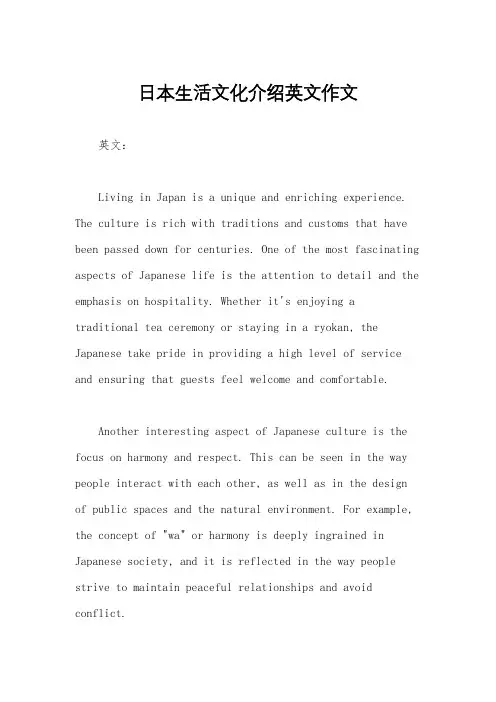
日本生活文化介绍英文作文英文:Living in Japan is a unique and enriching experience. The culture is rich with traditions and customs that have been passed down for centuries. One of the most fascinating aspects of Japanese life is the attention to detail and the emphasis on hospitality. Whether it's enjoying atraditional tea ceremony or staying in a ryokan, the Japanese take pride in providing a high level of service and ensuring that guests feel welcome and comfortable.Another interesting aspect of Japanese culture is the focus on harmony and respect. This can be seen in the way people interact with each other, as well as in the design of public spaces and the natural environment. For example, the concept of "wa" or harmony is deeply ingrained in Japanese society, and it is reflected in the way people strive to maintain peaceful relationships and avoid conflict.In addition, the food culture in Japan is truly exceptional. From fresh sushi and sashimi to hearty bowls of ramen, Japanese cuisine is diverse and delicious. I have had the pleasure of trying many different types of Japanese dishes, and each one has left a lasting impression on me. The attention to presentation and the use of seasonal ingredients make dining in Japan a memorable experience.Living in Japan has also given me the opportunity to participate in various cultural activities, such as wearing a kimono, learning the art of origami, and attending traditional festivals. These experiences have allowed me to gain a deeper understanding and appreciation for Japanese culture.Overall, life in Japan is a wonderful blend oftradition and modernity, and I feel fortunate to have the chance to immerse myself in such a unique and captivating culture.中文:生活在日本是一种独特而丰富的体验。

日式文化介绍英文作文下载温馨提示:该文档是我店铺精心编制而成,希望大家下载以后,能够帮助大家解决实际的问题。
文档下载后可定制随意修改,请根据实际需要进行相应的调整和使用,谢谢!并且,本店铺为大家提供各种各样类型的实用资料,如教育随笔、日记赏析、句子摘抄、古诗大全、经典美文、话题作文、工作总结、词语解析、文案摘录、其他资料等等,如想了解不同资料格式和写法,敬请关注!Download tips: This document is carefully compiled by theeditor. I hope that after you download them,they can help yousolve practical problems. The document can be customized andmodified after downloading,please adjust and use it according toactual needs, thank you!In addition, our shop provides you with various types ofpractical materials,such as educational essays, diaryappreciation,sentence excerpts,ancient poems,classic articles,topic composition,work summary,word parsing,copyexcerpts,other materials and so on,want to know different data formats andwriting methods,please pay attention!Japanese culture is really interesting. They have unique food like sushi and ramen that are loved by people all over the world.The anime and manga in Japanese culture are super popular. You can see characters with all kinds of amazing powers and stories.The traditional Japanese gardens are so beautiful and peaceful. It's like stepping into another world.Their festivals are full of colors and excitement. People dress up in traditional clothes and have a great time.The respect for elders and traditions is very strong in Japanese society. It shows in their daily lives.。
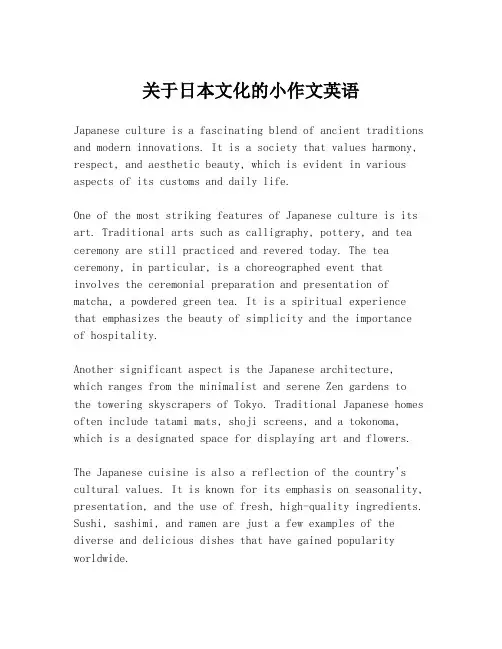
关于日本文化的小作文英语Japanese culture is a fascinating blend of ancient traditions and modern innovations. It is a society that values harmony, respect, and aesthetic beauty, which is evident in various aspects of its customs and daily life.One of the most striking features of Japanese culture is its art. Traditional arts such as calligraphy, pottery, and tea ceremony are still practiced and revered today. The tea ceremony, in particular, is a choreographed event that involves the ceremonial preparation and presentation of matcha, a powdered green tea. It is a spiritual experience that emphasizes the beauty of simplicity and the importance of hospitality.Another significant aspect is the Japanese architecture, which ranges from the minimalist and serene Zen gardens to the towering skyscrapers of Tokyo. Traditional Japanese homes often include tatami mats, shoji screens, and a tokonoma, which is a designated space for displaying art and flowers.The Japanese cuisine is also a reflection of the country's cultural values. It is known for its emphasis on seasonality, presentation, and the use of fresh, high-quality ingredients. Sushi, sashimi, and ramen are just a few examples of the diverse and delicious dishes that have gained popularity worldwide.In terms of social norms, the Japanese place a high value on politeness and social hierarchy. Bowing is a common way to greet, show respect, or apologize. The language itself has different levels of politeness and formality, which arechosen based on the speaker's relationship to the listener.Contemporary Japan is also known for its technological advancements and pop culture. From anime and manga to video games and robotics, Japan has a significant influence onglobal entertainment and innovation.In conclusion, Japanese culture is a rich tapestry of history, tradition, and modernity. It is a culture that continues to evolve while maintaining a deep respect for its roots.Whether you are interested in its traditional arts, culinary delights, or technological achievements, Japan offers aunique and enriching cultural experience.。
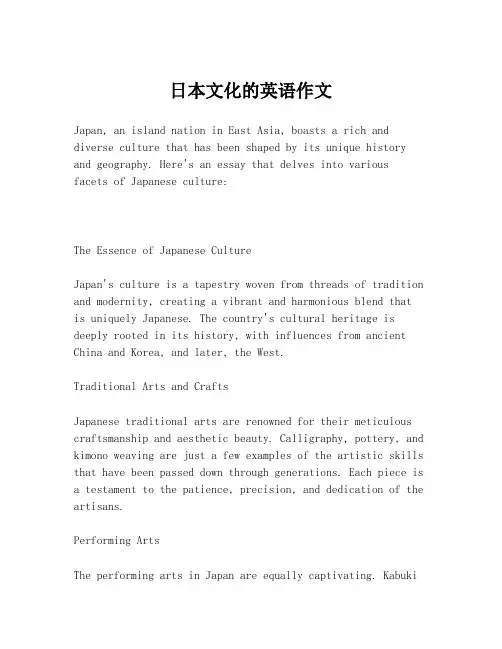
日本文化的英语作文Japan, an island nation in East Asia, boasts a rich and diverse culture that has been shaped by its unique history and geography. Here's an essay that delves into various facets of Japanese culture:The Essence of Japanese CultureJapan's culture is a tapestry woven from threads of tradition and modernity, creating a vibrant and harmonious blend thatis uniquely Japanese. The country's cultural heritage is deeply rooted in its history, with influences from ancient China and Korea, and later, the West.Traditional Arts and CraftsJapanese traditional arts are renowned for their meticulous craftsmanship and aesthetic beauty. Calligraphy, pottery, and kimono weaving are just a few examples of the artistic skills that have been passed down through generations. Each piece is a testament to the patience, precision, and dedication of the artisans.Performing ArtsThe performing arts in Japan are equally captivating. Kabukiand Noh theater are two forms that have been preserved and cherished for centuries. They are characterized by stylized movements, elaborate costumes, and masks that tell stories of ancient folklore and historical events.Festivals and CelebrationsFestivals, or "matsuri," are an integral part of Japanese culture, reflecting the country's deep connection with nature and the spiritual world. The Gion Matsuri in Kyoto and the Sapporo Snow Festival are just two examples of the many vibrant celebrations that take place throughout the year.CuisineJapanese cuisine is a culinary art form that emphasizes the use of fresh, seasonal ingredients and a balance of flavors. Sushi, sashimi, tempura, and ramen are well-known dishes that have gained popularity worldwide. The presentation of food is as important as the taste, reflecting the Japanese aesthetic of simplicity and elegance.Language and LiteratureThe Japanese language, with its complex system of honorifics and nuances, reflects the country's social structure and respect for hierarchy. Japanese literature is rich with poetry, novels, and short stories that often explore themes of nature, love, and the human condition.Technology and InnovationIn contrast to its traditional roots, Japan is also a global leader in technology and innovation. From robotics to electronics, Japan's advancements have had a profound impact on the world. This modern aspect of Japanese culture is a testament to the country's ability to adapt and evolve.ConclusionIn essence, Japanese culture is a harmonious blend of the old and the new, a balance that is reflected in every aspect of Japanese life. It is a culture that values respect, harmony, and beauty, and one that continues to captivate and inspire people around the world.This essay provides a snapshot of the multifaceted nature of Japanese culture, highlighting its traditional arts, performing arts, festivals, cuisine, language, and modern technological advancements.。
日式文化介绍英文作文Japanese culture is rich and diverse, with a long history and many traditional customs. From the elegant tea ceremony to the vibrant festivals, there are many aspects of Japanese culture that are worth exploring.One of the most iconic symbols of Japanese culture is the beautiful and intricate art of origami. Thistraditional paper-folding craft has been practiced in Japan for centuries and is a popular pastime for people of all ages.Another important part of Japanese culture is the traditional clothing, such as the kimono. The kimono is a stunning garment with vibrant colors and intricate designs, and it is often worn on special occasions and festivals.Japanese cuisine is also a significant part of the culture, with its emphasis on fresh, seasonal ingredients and beautiful presentation. From sushi to tempura, Japanesefood is known for its exquisite flavors and artistic presentation.The traditional Japanese tea ceremony is a highly ritualized and meditative practice that embodies the principles of harmony, respect, purity, and tranquility. It is a beautiful and serene experience that has been passed down through generations.Japanese festivals, or matsuri, are lively and colorful events that celebrate the seasons, historical events, and religious traditions. From the cherry blossom festivals in spring to the lantern festivals in summer, these events are a vibrant expression of Japanese culture.Japanese gardens are known for their peaceful and contemplative beauty, with carefully arranged plants, rocks, and water features that create a serene and harmonious environment. These gardens are a reflection of the Japanese appreciation for nature and the changing seasons.The traditional Japanese arts, such as calligraphy,flower arranging, and pottery, are highly revered and practiced as a way to cultivate discipline, focus, and creativity. These arts are an integral part of Japanese culture and are deeply ingrained in everyday life.。
日本风俗文化的魅力Japan, an island nation nestled in the Pacific Ocean,is renowned for its rich and diverse cultural heritage. Its customs, traditions, and way of life are deeply ingrainedin the hearts of its people, shaping the unique identity of the country. From the elaborate festivals and ceremonies to the intricate art forms and culinary delights, the Japanese culture offers a fascinating glimpse into the essence ofits society.One of the most striking aspects of Japanese culture is its emphasis on respect and harmony. This is evident in the daily interactions of its people, who are known for their politeness and consideration. The concept of "wa" or harmony is a fundamental principle in Japanese society, promoting cooperation and mutual understanding. This ethos is reflected in various aspects of Japanese life, including work, education, and even family life.Another notable feature of Japanese culture is its dedication to tradition and ritual. The country boasts a myriad of festivals and ceremonies that are celebrated with great enthusiasm and reverence. From the livelycelebrations of the New Year to the solemn rituals of Shinto and Buddhism, these events provide a window into the deep-rooted beliefs and values of the Japanese people.The Japanese arts are also renowned worldwide for their uniqueness and elegance. From the graceful movements of traditional dance to the intricate details of pottery and painting, these art forms reflect the aestheticsensibilities and creative spirit of the Japanese. The tea ceremony, in particular, is a testament to the Japanese appreciation for simplicity and natural beauty.Moreover, Japanese cuisine is a testament to the country's rich culinary heritage. The meticulous preparation of dishes, the emphasis on seasonality and freshness, and the harmonious blending of flavors all contribute to the unique charm of Japanese food. From sushi and ramen to tempura and izakaya, these culinary delights are not only a pleasure for the taste buds but also a journey through the rich history and culture of Japan.Furthermore, the Japanese way of dressing, known as "kimono," is another emblem of the country's cultural identity. The intricate patterns and vibrant colors of thekimono reflect the artistic sensibilities of the Japanese, while the act of dressing in a kimono itself is aritualized process that强调了尊重和谦逊的文化价值。
日本的优秀文化作文英语Japan is a country that is rich in culture andtradition. From its unique cuisine to its beautiful art, Japan has much to offer the world. In this essay, we will explore some of the most exceptional aspects of Japanese culture.One of the most famous Japanese traditions is the tea ceremony. This ceremony dates back to the 16th century andis a way to celebrate the beauty of simplicity. The ceremony is usually held in a traditional Japanese tea room, which is designed to create a calm and peaceful atmosphere. During the ceremony, guests are served a special type of green tea called matcha, which is prepared in a specific way. The tea is served with small sweets, and guests are expected to follow certain etiquette.Another unique aspect of Japanese culture is its traditional clothing. The most famous of these is the kimono, which is a long, flowing robe worn by both men andwomen. Kimonos are often made of silk or other high-quality materials and are decorated with intricate designs. They are typically worn on special occasions, such as weddings or festivals.Japanese cuisine is also known for its unique flavors and presentation. One of the most famous dishes is sushi, which is made with rice and raw fish. Sushi is often served in small portions and presented in an artistic way. Another popular dish is tempura, which is made by deep-frying seafood or vegetables in a light batter. Japanese cuisine also includes a variety of soups, such as miso soup, which is made with fermented soybean paste.Japanese art is also world-renowned for its beauty and attention to detail. One of the most famous forms of Japanese art is the ukiyo-e, which is a type of woodblock print. Ukiyo-e prints often depict scenes from everyday life, such as landscapes or portraits. Another famous form of Japanese art is calligraphy, which is the art of writing characters in a beautiful and artistic way.In addition to these traditional aspects of Japanese culture, Japan is also known for its advancements in technology and innovation. Japan is home to many leading technology companies, such as Sony and Toyota. The country is also known for its high-speed trains and advanced robotics.In conclusion, Japan is a country that is rich in culture and tradition. From its unique cuisine to its beautiful art, Japan has much to offer the world. Whether you are interested in tea ceremonies, traditional clothing, or cutting-edge technology, Japan has something for everyone.。